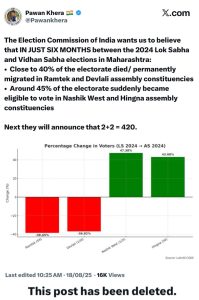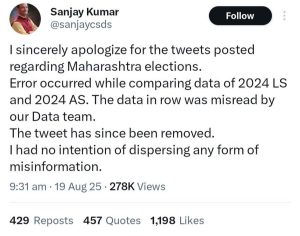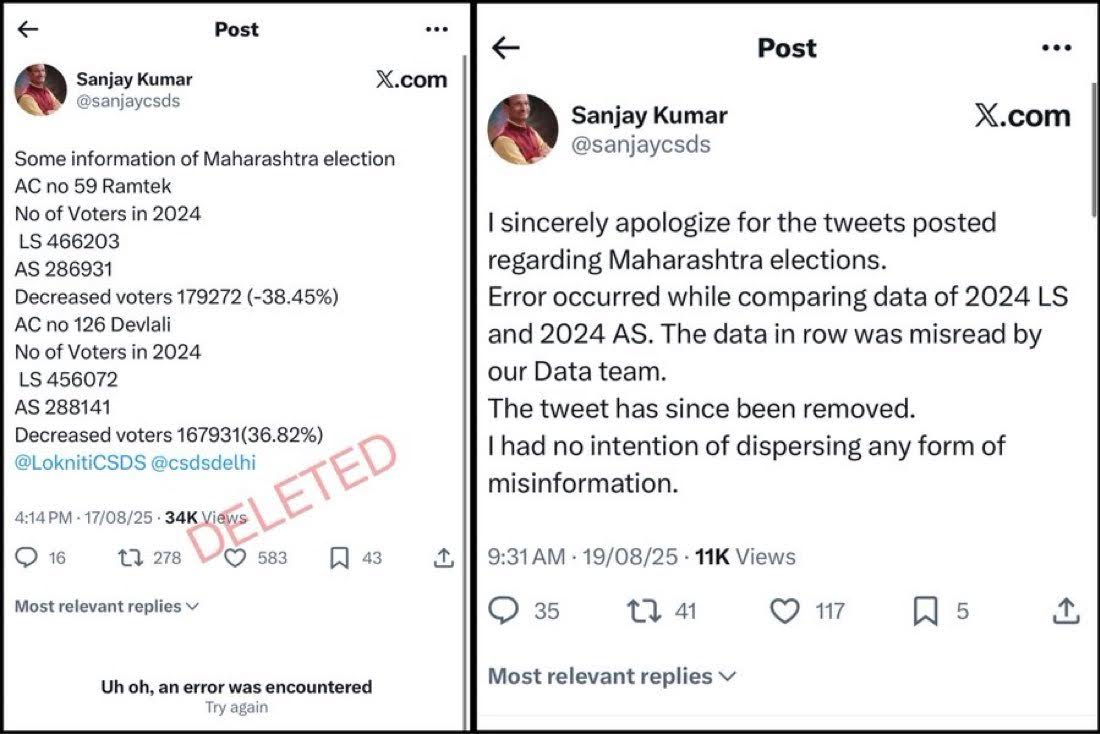The controversy began when Rahul Gandhi and other opposition leaders alleged that the ECI was complicit in “vote theft” through fraudulent voter lists, particularly in the context of recent elections. Sanjay Kumar, an election analyst, echoed these claims, lending apparent credibility to the accusations. However, the ECI’s swift rebuttal, backed by Chief Election Commissioner Gyanesh Kumar’s demand for an affidavit or apology, has exposed the fragility of these allegations. Posts on X reveal the intensity of the backlash, with users decrying the opposition’s claims as “baseless” and accusing them of undermining India’s democracy after electoral defeats. The deletion of a tweet by Pawan Khera further fuels suspicion, suggesting an acknowledgment of error—or perhaps a strategic retreat. Meanwhile, Congress leader Supriya Shrinate’s silence and the continued “vote chor” sloganeering by others in the opposition signal a refusal to back down, raising concerns about their motives.

The ECI is the backbone of India’s democratic process, ensuring free and fair elections in a nation of over 1.4 billion people. Tarnishing its credibility without evidence is not a trivial matter. The opposition’s allegations risk sowing distrust among voters, potentially destabilizing the democratic framework. The question arises: who is responsible for this erosion of trust? Is it a spontaneous mistake born of political frustration, or a deliberate attempt to weaken a constitutional institution? The coordinated nature of the accusations, coupled with the lack of substantiation, points to the latter. Sanjay Kumar’s role as an analyst adds a layer of complexity—his expertise should demand rigorous evidence, yet his claims appear to align suspiciously with the opposition’s narrative. This raises the possibility of a orchestrated effort to challenge the ECI’s legitimacy, perhaps as a tactic to rally supporters after electoral setbacks.
The demand for accountability is justified. First, commit a scandal; then, issue an apology—this pattern has become all too common in Indian politics. But apologies alone cannot undo the damage caused by reckless allegations. The opposition’s “vote chor” rhetoric is being weaponized to question the integrity of the electoral process, and the absence of concrete evidence suggests a deeper agenda. Booking Rahul Gandhi and Sanjay Kumar for defamation or incitement could serve as a deterrent, signaling that constitutional institutions are not punching bags for political point-scoring. The ECI’s call for proof is a litmus test: if the opposition cannot substantiate their claims, they must face consequences for their actions. Supriya Shrinate’s silence and Pawan Khera’s deleted tweet only deepen the perception of guilt or backtracking, further eroding their credibility.

However, we must also consider the broader context. Political rhetoric often thrives on hyperbole, especially in a polarized environment. The opposition may argue that their allegations stem from genuine concerns about electoral transparency. Yet, without evidence, such claims are irresponsible at best and malicious at worst. The ECI has maintained its independence through decades of complex elections, and undermining it without cause threatens the democratic fabric. If this is indeed a conspiracy, its aim appears clear: to create distrust in the ECI and destabilize public confidence in governance.
In conclusion, the “vote chor” controversy is not a mere mistake but a dangerous precedent. Rahul Gandhi, Sanjay Kumar, and their allies must either provide irrefutable evidence or issue unequivocal apologies. Legal action may be warranted to protect the ECI’s sanctity. The opposition’s actions risk long-term damage to India’s democratic institutions, and the responsibility lies squarely with those who wield accusations as weapons without proof. The nation deserves better than slogans that sow division—democracy demands accountability, not conspiracies.





